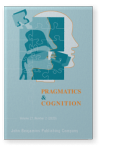Vol. 27:2 (2020) ► pp.408–431
‘Die’ and its different situation-bound utterances in Persian
In this paper, using the tenets of Situation-Bound Utterances (SBUs) (Kecskes 2000, 2010) and referring to Pragmatic Act Theory (PAT) (Mey 2001), the verb mordan (‘to die’ in English), and its different realisations are analysed among Persian speakers. Through the analysis of authentic talk in interaction, this study aims to ponder nonstandard (situation-derived) meanings of the term mordan and its different SBUs. The primary focus of the study is on strings of linguistic events as well as the “conventions of usage” (Morgan 1978) or cultural understanding that may lead to standard and nonstandard meanings considering mordan and its different SBUs. The findings suggest that the SBUs regarding mordan, a neglected sociolinguistic context, not only is affected by its actual situational characteristics but also by prior context encoded in utterances used, which manifests culture-specific ways of thinking (Capone 2018; Wong 2010). Overall, 19 SBUs and 7 generic categories were identified with regard to the verb mordan in Persian. This paper exhibits that mordan is a versatile verb, which, when combined with situational/contextual factors, conveys different nonstandard functions that fulfil social needs. This study will also refer to linguistic features underlying SBUs that are influential in assigning various distinct meanings to the verb mordan in Persian.
Article outline
- 1.Introduction
- 2.‘Die’ among cultures
- 3.Aim and scope
- 4.Method
- 5.The situation-bound categorisation of mordan
- 5.1Infatuation
- 5.2Hatred
- 5.3Intensification
- 5.4Attraction
- 5.5Sympathy
- 5.6Request
- 5.7Fear
- 5.8Criticism
- 5.9At last
- 5.10Impatience
- 5.11On no condition
- 5.12Disappearance
- 6.Discussion
- 7.Conclusion and implications
- Notes
-
References
